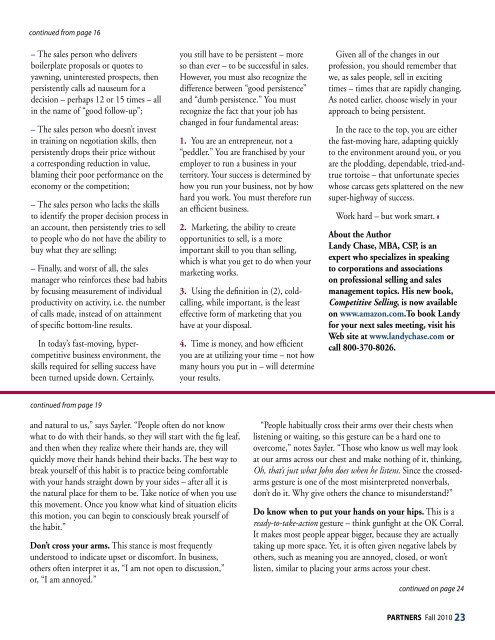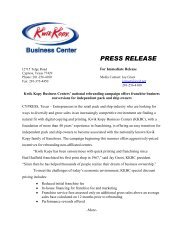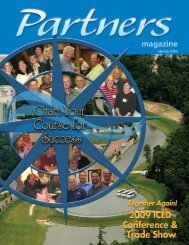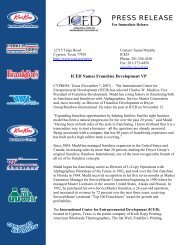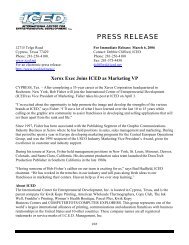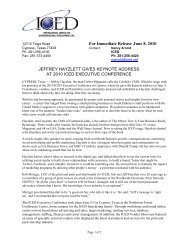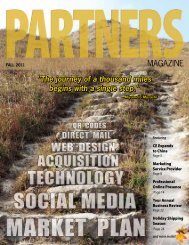Position Your Company for a Business Loan Using Facebook as a ...
Position Your Company for a Business Loan Using Facebook as a ...
Position Your Company for a Business Loan Using Facebook as a ...
Create successful ePaper yourself
Turn your PDF publications into a flip-book with our unique Google optimized e-Paper software.
continued from page 16<br />
– The sales person who delivers<br />
boilerplate proposals or quotes to<br />
yawning, uninterested prospects, then<br />
persistently calls ad nauseum <strong>for</strong> a<br />
decision – perhaps 12 or 15 times – all<br />
in the name of “good follow-up”;<br />
– The sales person who doesn’t invest<br />
in training on negotiation skills, then<br />
persistently drops their price without<br />
a corresponding reduction in value,<br />
blaming their poor per<strong>for</strong>mance on the<br />
economy or the competition;<br />
– The sales person who lacks the skills<br />
to identify the proper decision process in<br />
an account, then persistently tries to sell<br />
to people who do not have the ability to<br />
buy what they are selling;<br />
– Finally, and worst of all, the sales<br />
manager who rein<strong>for</strong>ces these bad habits<br />
by focusing me<strong>as</strong>urement of individual<br />
productivity on activity, i.e. the number<br />
of calls made, instead of on attainment<br />
of specific bottom-line results.<br />
In today’s f<strong>as</strong>t-moving, hypercompetitive<br />
business environment, the<br />
skills required <strong>for</strong> selling success have<br />
been turned upside down. Certainly,<br />
continued from page 19<br />
you still have to be persistent – more<br />
so than ever – to be successful in sales.<br />
However, you must also recognize the<br />
difference between “good persistence”<br />
and “dumb persistence.” You must<br />
recognize the fact that your job h<strong>as</strong><br />
changed in four fundamental are<strong>as</strong>:<br />
1. You are an entrepreneur, not a<br />
“peddler.” You are franchised by your<br />
employer to run a business in your<br />
territory. <strong>Your</strong> success is determined by<br />
how you run your business, not by how<br />
hard you work. You must there<strong>for</strong>e run<br />
an efficient business.<br />
2. Marketing, the ability to create<br />
opportunities to sell, is a more<br />
important skill to you than selling,<br />
which is what you get to do when your<br />
marketing works.<br />
3. <strong>Using</strong> the definition in (2), coldcalling,<br />
while important, is the le<strong>as</strong>t<br />
effective <strong>for</strong>m of marketing that you<br />
have at your disposal.<br />
and natural to us,” says Sayler. “People often do not know<br />
what to do with their hands, so they will start with the fig leaf,<br />
and then when they realize where their hands are, they will<br />
quickly move their hands behind their backs. The best way to<br />
break yourself of this habit is to practice being com<strong>for</strong>table<br />
with your hands straight down by your sides – after all it is<br />
the natural place <strong>for</strong> them to be. Take notice of when you use<br />
this movement. Once you know what kind of situation elicits<br />
this motion, you can begin to consciously break yourself of<br />
the habit.”<br />
Don’t cross your arms. This stance is most frequently<br />
understood to indicate upset or discom<strong>for</strong>t. In business,<br />
others often interpret it <strong>as</strong>, “I am not open to discussion,”<br />
or, “I am annoyed.”<br />
4. Time is money, and how efficient<br />
you are at utilizing your time – not how<br />
many hours you put in – will determine<br />
your results.<br />
Given all of the changes in our<br />
profession, you should remember that<br />
we, <strong>as</strong> sales people, sell in exciting<br />
times – times that are rapidly changing.<br />
As noted earlier, choose wisely in your<br />
approach to being persistent.<br />
In the race to the top, you are either<br />
the f<strong>as</strong>t-moving hare, adapting quickly<br />
to the environment around you, or you<br />
are the plodding, dependable, tried-andtrue<br />
tortoise – that un<strong>for</strong>tunate species<br />
whose carc<strong>as</strong>s gets splattered on the new<br />
super-highway of success.<br />
Work hard – but work smart. z<br />
About the Author<br />
Landy Ch<strong>as</strong>e, MBA, CSP, is an<br />
expert who specializes in speaking<br />
to corporations and <strong>as</strong>sociations<br />
on professional selling and sales<br />
management topics. His new book,<br />
Competitive Selling, is now available<br />
on www.amazon.com.To book Landy<br />
<strong>for</strong> your next sales meeting, visit his<br />
Web site at www.landych<strong>as</strong>e.com or<br />
call 800-370-8026.<br />
“People habitually cross their arms over their chests when<br />
listening or waiting, so this gesture can be a hard one to<br />
overcome,” notes Sayler. “Those who know us well may look<br />
at our arms across our chest and make nothing of it, thinking,<br />
Oh, that’s just what John does when he listens. Since the crossedarms<br />
gesture is one of the most misinterpreted nonverbals,<br />
don’t do it. Why give others the chance to misunderstand?”<br />
Do know when to put your hands on your hips. This is a<br />
ready-to-take-action gesture – think gunfight at the OK Corral.<br />
It makes most people appear bigger, because they are actually<br />
taking up more space. Yet, it is often given negative labels by<br />
others, such <strong>as</strong> meaning you are annoyed, closed, or won’t<br />
listen, similar to placing your arms across your chest.<br />
continued on page 24<br />
PARTNERS Fall 2010 23


